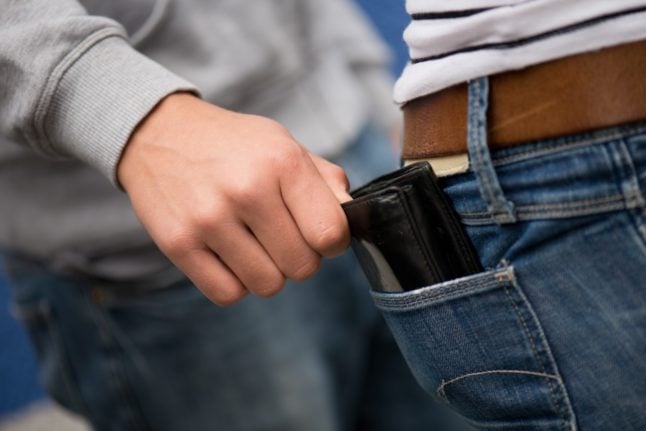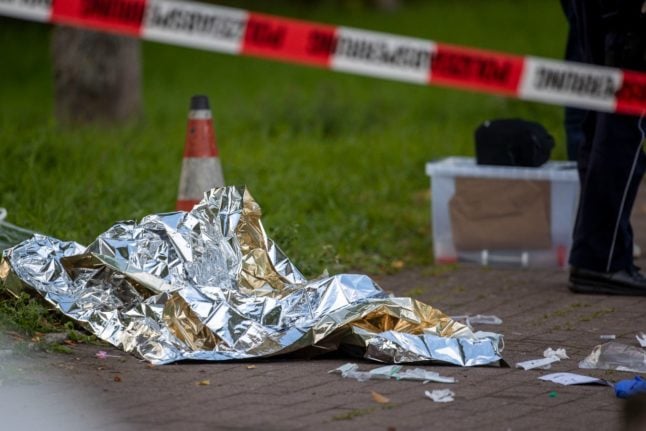FACT CHECK: Is crime really on the rise in Germany?

New statistics from Germany's federal police show an uptick in almost every type of criminal activity, from petty theft to violence. But do the stats reflect the reality?
Crime is on the rise in Germany - at least, that's what the latest statistics appear to show.
In a press conference held on Thursday, Interior Minister Nancy Faeser (SPD) set out a disheartening array of figures that suggested crime had shot up by 11.5 percent in Germany between 2021 and 2022.
Though some of this hike can be explained by society reopening after the pandemic, crime reports increased by 3.5 even when compared to pre-corona times.
Overall, the Federal Police Office (BKA) registered 5.6 million reported crimes throughout the year, with upticks in almost all types of criminal activity.
READ ALSO: Which German train stations have the highest crime rates?
The statistics show the number of offences reported to the police, regardless of whether they resulted in charges. Between 2021 and 2022, number of cases solved by the police sank slightly to 57.3 - a drop of 1.4 percent.
There BKA recorded particularly significant increases in certain types of offences, including pickpocketing, shoplifting, break-ins, white collar crime, and robbery.
Violent crime also rose significantly both year-on-year and compared to pre-pandemic times, with 197,000 offences reported in 2022 compared to 181,000 in 2019. That represents an increase of nine percent.
White collar crime rose by 80 percent over the same period, while immigration-related offences went up by 36 percent and the number of reported sexual assaults increased by 26 percent. Meanwhile, the number of breaking and entering offences shot up by 21 percent.
Does this mean Germany is getting more dangerous?
That's one way of seeing it - but experts caution against reading too much into the data.
Speaking to Tagesschau after the release of the statistics, Klaus Boers, Professor of Criminology at the University of Münster, said he saw no reason for alarm for the time being. "Since 2007, a massive decline has been measured at all levels of crime worldwide," he explained.
According to Boers, a one-time increase in offences isn't necessarily indicative of a longer term trend.
This is especially true when it comes to the shorter term picture between 2021 and 2022. With Covid measures ensuring people stayed home much more often, there was far less opportunity for crimes like pickpocketing and break-ins to occur.

A pick pocket takes a wallet out of someone's back pocket. Photo: picture alliance / dpa | Arno Burgi
The lifting of Covid restrictions is also likely to have had an impact on breaches of immigration, asylum, and EU Freedom of Movement laws. Border checks during the pandemic made unauthorised entry in Germany much more difficult, so it follows that there would be a jump in illegal crossings when these were lifted.
The pandemonium of New Year's Eve 2022/23 - when fireworks were allowed in towns and cities once again - can also be partly put down to a 'rebound' effect after two years of lockdowns and restrictions.
READ ALSO: Germany debates fireworks ban after New Year's Eve chaos
However, there are some other factors that could be inflating the figures - not least the sharp rise in poverty over the past few years.
This particularly correlates to higher levels of crime in teenagers and young people, according to Holger Münch, chief of the Federal Police.
"The risk is increased by factors such as economic aspects, own experiences of violence in childhood, the environment, i.e. the peer group, or stress. Keyword 'Corona,'" he explained.
What else could explain the increase in numbers?
One simple explanation is that, rather than there being an increase in crime, there has actually been an increase in the willingness to report crime.
According to Interior Minister Nancy Faeser (SPD), the statistics represent the "light field" - potential offences that police and authorities are aware of - rather than the "dark field" of unreported crime.
"The dark field has become smaller, the bright field larger," she told reporters at the press conference on Thursday.
One prominent example of this is the increasing number of women who are reporting sexual harassment or assault. Faeser sees this as a kind of #metoo effect that encourages women not to stay silent after experiencing gender-based violence.

A suspect in court in Beckum, North Rhine-Westphalia. Photo: picture alliance/dpa | Bernd Thissen
Another example is child abuse. Since Germany started working with USA's National Center for Missing and Exploited Children - an organisation that collects information about potential abuse online and passes it on to police forces around the world - the number of cases it records has risen sharply.
Due to Russia's invasion of Ukraine, Germany also saw an unprecedented wave of immigration in 2022, which could also have impacted statistics.
Münch said that migration was likely to have impacted the crime statistics, alongside inflation and the economic situation. That's partly because the population has grown and partly because there are a higher number of people who have experienced traumatic situations like war zones, who have fled to the country.
An increase in the youth population could also be one of the reasons why the number of children committing offences rose by around 16 percent between 2019 and 2023.
"It is good that the figures exist, but they do not allow us to draw any conclusions about a higher level of brutality or neglect among today's youth," explained Fredericke Leuschner, a sociologist at the Centre for Criminology.
"Instead, there are figures on the number of suspects, which put the frequency of offences in relation to the population figures. If there are more young people, there are also more crimes committed by young people."
READ ALSO: German Interior Minister wants bigger crackdown on guns after Hamburg shooting
Changes in the law
There are have also been a number of legal changes that expand what could be considered 'strafbar' - or punishable by criminal law - over the past few years in Germany.
Until 2021, only death threats were considered serious enough to be a criminal offence - but in the meantime the field has been widened to include threats of sexual assault or of damaging valuable items of property such as a car or house. This could have naturally contributed to an uptick in this type of offence.
It's also a good idea to look at the actual numbers of offences rather than just the increases or decreases: 20 percent may seem like a lot, but if you start with 50 offences a year, it's only an increase of ten.

A crime scene cordoned off by German police. Photo: picture alliance/dpa | Christoph Reichwein
This is the view taken by criminology professor Klaus Boers, who recommends looking both at longer term trends and at the basic level of crime within the population. For example, in 2022, only 0.6 percent of all youths or adolescents were registered for a violent offence.
"So far, we only have the police crime statistics, that is, the offences registered by the police," he told Tagesschau. "This does not include the causes of crime - for that you need interviews with offenders, but these are only conducted every two years and only in Lower Saxony."
"The next time will be in 2023, when we will be able to say more, including about migration backgrounds."
Speaking at the press conference on Thursday, Interior Minister Faeser also made the point that overall crime remained low in Germany.
"There is a clear increase (in reported offences) and we now know where we need to take action," said Faeser. "Nevertheless, this still applies: we are a safe country with a strong rule of law."
READ ALSO: How New Year's Eve fireworks chaos sparked a racism debate in Germany
Comments
See Also
Crime is on the rise in Germany - at least, that's what the latest statistics appear to show.
In a press conference held on Thursday, Interior Minister Nancy Faeser (SPD) set out a disheartening array of figures that suggested crime had shot up by 11.5 percent in Germany between 2021 and 2022.
Though some of this hike can be explained by society reopening after the pandemic, crime reports increased by 3.5 even when compared to pre-corona times.
Overall, the Federal Police Office (BKA) registered 5.6 million reported crimes throughout the year, with upticks in almost all types of criminal activity.
READ ALSO: Which German train stations have the highest crime rates?
The statistics show the number of offences reported to the police, regardless of whether they resulted in charges. Between 2021 and 2022, number of cases solved by the police sank slightly to 57.3 - a drop of 1.4 percent.
There BKA recorded particularly significant increases in certain types of offences, including pickpocketing, shoplifting, break-ins, white collar crime, and robbery.
Violent crime also rose significantly both year-on-year and compared to pre-pandemic times, with 197,000 offences reported in 2022 compared to 181,000 in 2019. That represents an increase of nine percent.
White collar crime rose by 80 percent over the same period, while immigration-related offences went up by 36 percent and the number of reported sexual assaults increased by 26 percent. Meanwhile, the number of breaking and entering offences shot up by 21 percent.
Does this mean Germany is getting more dangerous?
That's one way of seeing it - but experts caution against reading too much into the data.
Speaking to Tagesschau after the release of the statistics, Klaus Boers, Professor of Criminology at the University of Münster, said he saw no reason for alarm for the time being. "Since 2007, a massive decline has been measured at all levels of crime worldwide," he explained.
According to Boers, a one-time increase in offences isn't necessarily indicative of a longer term trend.
This is especially true when it comes to the shorter term picture between 2021 and 2022. With Covid measures ensuring people stayed home much more often, there was far less opportunity for crimes like pickpocketing and break-ins to occur.

The lifting of Covid restrictions is also likely to have had an impact on breaches of immigration, asylum, and EU Freedom of Movement laws. Border checks during the pandemic made unauthorised entry in Germany much more difficult, so it follows that there would be a jump in illegal crossings when these were lifted.
The pandemonium of New Year's Eve 2022/23 - when fireworks were allowed in towns and cities once again - can also be partly put down to a 'rebound' effect after two years of lockdowns and restrictions.
READ ALSO: Germany debates fireworks ban after New Year's Eve chaos
However, there are some other factors that could be inflating the figures - not least the sharp rise in poverty over the past few years.
This particularly correlates to higher levels of crime in teenagers and young people, according to Holger Münch, chief of the Federal Police.
"The risk is increased by factors such as economic aspects, own experiences of violence in childhood, the environment, i.e. the peer group, or stress. Keyword 'Corona,'" he explained.
What else could explain the increase in numbers?
One simple explanation is that, rather than there being an increase in crime, there has actually been an increase in the willingness to report crime.
According to Interior Minister Nancy Faeser (SPD), the statistics represent the "light field" - potential offences that police and authorities are aware of - rather than the "dark field" of unreported crime.
"The dark field has become smaller, the bright field larger," she told reporters at the press conference on Thursday.
One prominent example of this is the increasing number of women who are reporting sexual harassment or assault. Faeser sees this as a kind of #metoo effect that encourages women not to stay silent after experiencing gender-based violence.

Another example is child abuse. Since Germany started working with USA's National Center for Missing and Exploited Children - an organisation that collects information about potential abuse online and passes it on to police forces around the world - the number of cases it records has risen sharply.
Due to Russia's invasion of Ukraine, Germany also saw an unprecedented wave of immigration in 2022, which could also have impacted statistics.
Münch said that migration was likely to have impacted the crime statistics, alongside inflation and the economic situation. That's partly because the population has grown and partly because there are a higher number of people who have experienced traumatic situations like war zones, who have fled to the country.
An increase in the youth population could also be one of the reasons why the number of children committing offences rose by around 16 percent between 2019 and 2023.
"It is good that the figures exist, but they do not allow us to draw any conclusions about a higher level of brutality or neglect among today's youth," explained Fredericke Leuschner, a sociologist at the Centre for Criminology.
"Instead, there are figures on the number of suspects, which put the frequency of offences in relation to the population figures. If there are more young people, there are also more crimes committed by young people."
READ ALSO: German Interior Minister wants bigger crackdown on guns after Hamburg shooting
Changes in the law
There are have also been a number of legal changes that expand what could be considered 'strafbar' - or punishable by criminal law - over the past few years in Germany.
Until 2021, only death threats were considered serious enough to be a criminal offence - but in the meantime the field has been widened to include threats of sexual assault or of damaging valuable items of property such as a car or house. This could have naturally contributed to an uptick in this type of offence.
It's also a good idea to look at the actual numbers of offences rather than just the increases or decreases: 20 percent may seem like a lot, but if you start with 50 offences a year, it's only an increase of ten.

This is the view taken by criminology professor Klaus Boers, who recommends looking both at longer term trends and at the basic level of crime within the population. For example, in 2022, only 0.6 percent of all youths or adolescents were registered for a violent offence.
"So far, we only have the police crime statistics, that is, the offences registered by the police," he told Tagesschau. "This does not include the causes of crime - for that you need interviews with offenders, but these are only conducted every two years and only in Lower Saxony."
"The next time will be in 2023, when we will be able to say more, including about migration backgrounds."
Speaking at the press conference on Thursday, Interior Minister Faeser also made the point that overall crime remained low in Germany.
"There is a clear increase (in reported offences) and we now know where we need to take action," said Faeser. "Nevertheless, this still applies: we are a safe country with a strong rule of law."
READ ALSO: How New Year's Eve fireworks chaos sparked a racism debate in Germany
Join the conversation in our comments section below. Share your own views and experience and if you have a question or suggestion for our journalists then email us at [email protected].
Please keep comments civil, constructive and on topic – and make sure to read our terms of use before getting involved.
Please log in here to leave a comment.